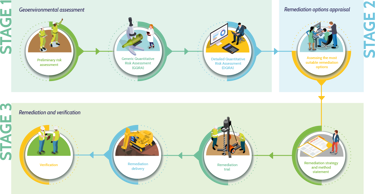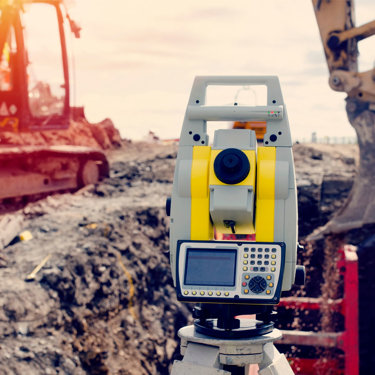
Contaminated land survey
Ready to discuss your project?
Please leave your details and a member of our team will reach out to discuss your requirements in more detail and arrange next steps.
We help investors, owners, operators and developers in a wide range of sectors – from chemicals and construction to real estate and utilities.
By combining our technical expertise with a commercially focused approach, we find land quality management solutions to manage and reduce risk, so that you can achieve your business and sustainability goals.
- Helps your business operate sustainably and effectively
- Expert technical analysis to investigate land quality issues
- Enables a transaction and development to proceed
- Project experience advising thousands of businesses on contaminated sites across the UK and Ireland
What is contaminated land?
Contaminated land is soil or water that has been impacted by human activity and which poses a threat to health or the local environment. Land is typically contaminated due to historical activity, waste materials or even naturally occurring compounds such as metals.
To be labelled as contaminated, a site must contain levels of a contaminant that could adversely affect human health or the surrounding environment.
What are contaminated land assessments?
To determine the level of contamination on a site, a series of contaminated land assessments and ground investigations are carried out by experts in line with the land contamination risk management (LCRM) process. The assessment identifies any land contamination that could have a detrimental impact and addresses what steps are needed to remediate the issue.
Our land contamination risk management (LCRM) process is made up of three stages.

Stage one: Geoenvironmental assessment
The initial step in a contaminated land assessment involves a desk study to review current and historical maps of the site area, reports and proposals, as well as a site inspection. This helps to identify any potential areas of contamination and informs the next stages of the process.
Site investigation, including soil and water samples, and geotechnical assessments are then carried out to identify any contamination and ground hazards to determine if any further risk assessment is required. A further detailed quantitative risk assessment (DQRA) is undertaken to determine what level of contamination is acceptable on the site and whether remediation is needed.
Stage two: Remediation options appraisal
This stage of the land contamination assessment involves creating strategies to reduce the levels of contamination to acceptable standards.
A variety of factors are taken into account to provide the most appropriate solution for the site including:
- Ground conditions
- The specific contaminants
- Time and space available
- Cost
- Restrictions and limitations
- Impact on sustainability
Stage three: Remediation and verification
Depending on the outcome of the land quality assessment and the factors considered in the previous stage, the remediation is carried out. Initially, this may focus on a small area of the site to form a trial remediation before extending the work to the larger area.
Our verification process involves demonstrating that the strategy to remove or reduce land contamination has been successful.
What exactly does a contaminated land survey assess?
All our contaminated land assessments must be undertaken in accordance with UK legislation.
Risks assessed include:
- Human health
- Property (existing or proposed) including buildings, crops, livestock, pets, woodland and service lines and pipes
- Adjoining land
- Groundwaters and surface waters
- Ecological systems
- Archaeological sites and ancient monuments
Why would you need a land contamination assessment?
Contaminated land can create all manner of complexities including technical, commercial and legal challenges. The implication to your business can be significant, especially when there are unexpected costs and delays relating to continued site operation, development, or potential transaction.
We aim to help you achieve minimal disruption while maximising the value of your transaction by thoroughly assessing risk and providing timely solutions to any land contamination issues. We also aim to protect your business through our environmental due diligence services to limit risk, liabilities and costs.
For developers, the assessment of land contamination is a requirement under the National Planning Policy Framework.
What happens if a site is found to be contaminated?
Depending on the results of the contaminated land survey, there are a variety of remediation options for reducing or mitigating the risks associated:
- In situ: this involves leaving the contamination in the ground and treating it via injection methods, pumping out hazardous materials or thermal treatment.
- Ex situ: removal of contamination is carried out with treatment methods such as bioremediation or soil stabilisation. Another option is to remove the contamination from the site by digging it up and sending it to an off-site treatment facility or landfill.
- Monitored natural attenuation (MNA): If a compound can be broken down naturally – for example, oil – we can monitor and verify that the process has been successful in removing the contamination from the ground.
“Borehole investigations allow for collection of soil and water samples to help characterise contamination on a site. This determines the level of risk and if any clean-up is required to reduce it.”
Neil Beswick, Contaminated Land Consultant
Contaminated land special sites
Certain contaminated land sites are referred to as special sites and are therefore regulated by the Environment Agency, Natural Resources Wales or the Scottish Environment Protection Agency (SEPA). These include sites that:
- seriously impact drinking waters, surface waters or groundwater sources
- are or have in the past been used for certain industrial activities, such as oil refining or making explosives
- are regulated under an integrated pollution control permit or pollution prevention and control regimes
- have been used to get rid of waste acid tars
- are owned or occupied by the Ministry of Defence
- contain radioactive contamination or are classed as nuclear sites
We have extensive experience of undertaking contaminated land surveys across such sites and can advise on the most appropriate course of action.
What sectors do our contaminated land assessments cover?
Our expertise covers a huge variety of sectors to help businesses overcome challenges relating to land contamination across an extensive range of sites including:
We have a wealth of experience in providing solutions for businesses across these sectors to help them achieve the best outcomes both for the environment and financially.
Why choose Adler and Allan for your business land contamination survey?
Mitigating risk and reducing liability is key to a successful outcome when dealing with contaminated land. Our experts can conduct a thorough land contamination report to help you and your business achieve maximum performance and cost-efficiency.
- Professional expertise and experience: Our team have the highest level of dedication, skills and tools to provide the best advice and solutions for your land contamination challenges. We've worked on hundreds of land development projects including some of the most hazardous sites across the UK and Ireland. Our white papers demonstrate our commitment to an environmentally friendly future.
- We can carry out surveys to suit your site needs: Whether you need single or multiple site land contamination surveys, our experts can help you with all your site transactions.
- We can help you get the most out of your transaction: Our aim is to help you achieve maximum return on investment for your site transaction whatever sector you're based in.
- Trusted source of knowledge and solutions: Developers, construction companies and design team members rely on us to deliver high-quality advice and solutions to businesses across the UK and Ireland.
- Solutions tailored to your business: We understand that no two projects are equal and we tailor take into account your individual and complex business needs to provide the right solutions for you.
- Timely advice and solutions: We're able to work to very short timescales, even on the most challenging projects, to help reduce costs and increase efficiencies.
- Accredited and certified: We hold accreditations and certifications that demonstrate our commitment and skills in land contamination assessments, advice and solutions.
- A network of depots: We have operational offices and depots across the UK and Ireland that allow us to offer some of the broadest geographical reach in the industry.
Contaminated land assessment case studies
Achieving £750k in savings for a fuel business purchase
We helped our client secure a safer, substantially improved fuel business, with a distinct competitive advantage, and save £750,000 during the transaction.
The project: a UK fuel supplier identified a potential fuel company and oil depot acquisition within a key northern territory. We were tasked with identifying the risks of the purchase, including environmental issues and land contamination hazards, and providing a solution to suit the needs of the business and the local environment while limiting associated costs.
Our solution: we carried out a thorough land contamination assessment to uncover the challenges and concerns relating to the high contamination levels. Our expert analysis of the site's pollution risks led to a £500k reduction of the purchase price. We proved the site could be made safe and compliant through smaller-scale remediation – for £250k less than expected.
One oil depot deal, two clients, and £11.2m saved
We achieved huge cost savings for clients on both sides of an oil depots transaction between a leading UK fuel supplier and a multi-national business.
The project: Initially supporting the seller, we advised them on liabilities for the sale of their 42-site portfolio of oil depots. 10 high-risk sites were flagged by the buyer's consultant due to complex and substantial contamination issues which meant these were excluded from the buyer's environmental impairment liability policy. The clean-up of these sites was estimated to be £12 million.
Our solution: We were jointly appointed post-acquisition by the buyer, their legal advisors, and the insurers to address the contamination issues on the 10 flagged sites. Through detailed contaminated land surveys and remediation, we either addressed uncertainties or reduced contamination levels on all 10 sites to the satisfaction of all stakeholders (including regulators) while saving £11.2 million against the original provision. The work reduced environmental impacts, allowed a business-critical transaction to go ahead, saved the seller a large sum of money, and reduced legal liabilities across the portfolio.
Cost-saving pollution prevention after undetected 50,000-litre diesel spill
We undertook immediate action when alerted to a 50,000-litre diesel spill at a water utilities company. We carried out an in-depth contaminated land assessment and implemented successful solutions to reduce the environmental impact and minimise associated costs.
The project: a damaged diesel tank – used for backup power generation – leaked 50,000 litres of fuel into the surrounding area, placing local water sources at risk. With no monitoring, air testing or maintenance records in place, the spill was left undiscovered until the tank was due for a routine refill. Our specialist onsite crews were tasked with the clean-up and a long-term improvement strategy.
Our solution: our in-depth investigations revealed the volume of the spill – and the urgency of protecting the local environment including area water sources. We recovered the oil quickly and efficiently with minimal impact to the environment by:
- constructing a negative gradient to prevent fuel from flowing into waterways
- using an ad-hoc pump-and-treat system to separate vast quantities of oil from polluted water
- clearing and emptying wells of contaminants
- removing residual pollutants from site sewers through drain jetting
- borehole drilling to allow quick access to groundwater samples
Reduce the risk and maximise potential with our in-depth contaminated land surveys
Our land contamination assessments can help you make the right business decisions, facilitate a smooth transaction or development, and limit operational disruption. Discover how our experts can help you with assessing potential sites, implementing robust solutions and creating long-term strategies to minimise environmental impact and reduce business costs.
Contact our contaminated land consultants
